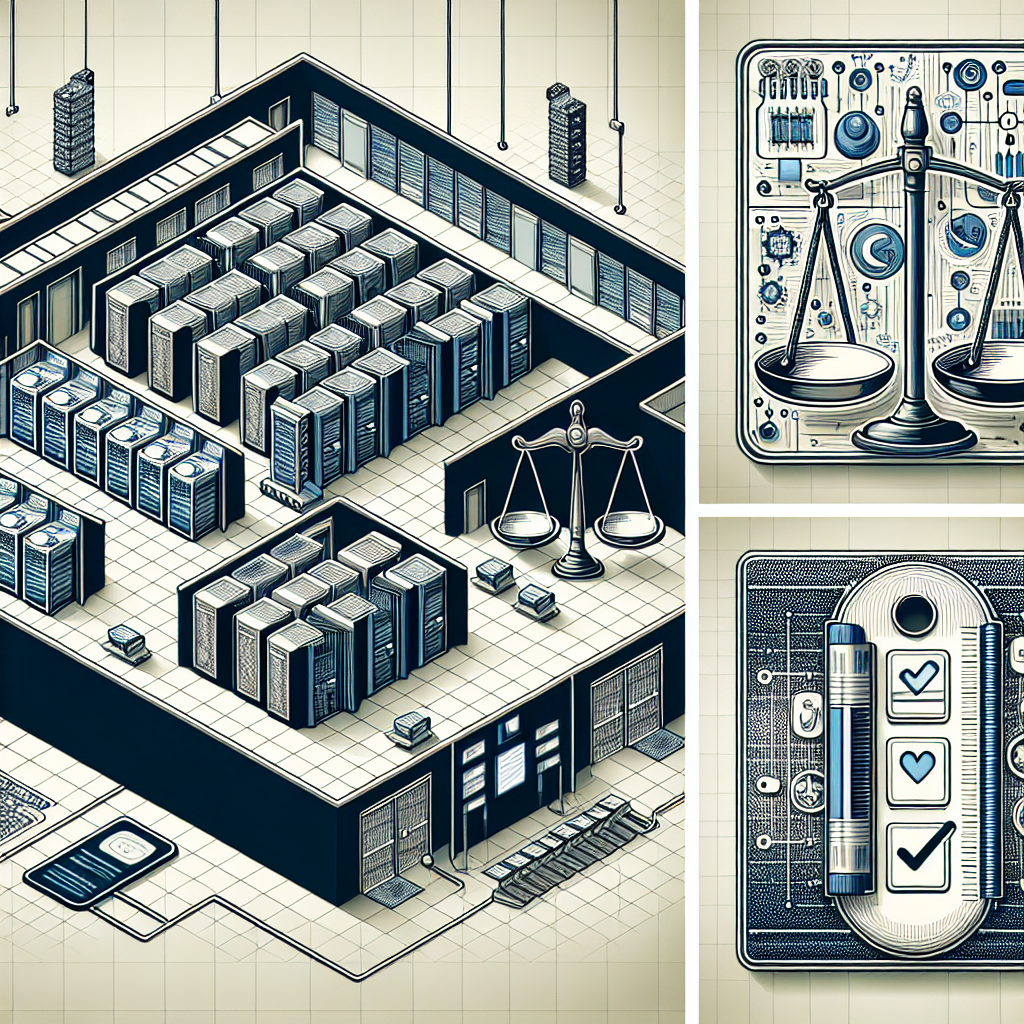Your cart is currently empty!
Tag: Regulatory

Key Considerations for Achieving Data Center Compliance in a Changing Regulatory Landscape
In today’s rapidly changing regulatory landscape, data center compliance has become a critical issue for businesses of all sizes. With the increasing amount of sensitive data being stored and processed in data centers, ensuring compliance with industry regulations and standards is essential to protect this information and avoid costly penalties.Achieving and maintaining data center compliance requires a thorough understanding of the regulatory requirements that apply to your organization, as well as a proactive approach to addressing any potential compliance gaps. Here are some key considerations for ensuring data center compliance in a changing regulatory landscape:
1. Stay informed about regulatory changes: One of the biggest challenges in maintaining data center compliance is keeping up with the constantly evolving regulatory landscape. New laws and regulations are introduced regularly, and existing regulations are often updated to reflect changes in technology and security threats. To ensure compliance, it is essential to stay informed about these changes and understand how they may impact your data center operations.
2. Conduct regular compliance assessments: Regularly assessing your data center operations against regulatory requirements is essential for identifying and addressing compliance gaps. Conducting comprehensive compliance assessments can help you identify areas where your data center may be falling short of regulatory requirements and take steps to address these issues before they become a compliance risk.
3. Implement strong security measures: Data security is a critical component of data center compliance, as many regulations require organizations to implement robust security measures to protect sensitive data. This may include encryption, access controls, and data loss prevention measures, among others. Implementing strong security measures can help you protect sensitive data and ensure compliance with regulatory requirements.
4. Train your staff: Compliance is not just about implementing the right policies and procedures – it also requires ensuring that your staff are trained on these policies and understand their roles and responsibilities in maintaining compliance. Providing regular training on data center compliance can help ensure that your staff are aware of their obligations and can help you avoid costly compliance violations.
5. Monitor and audit your data center operations: Regularly monitoring and auditing your data center operations is essential for maintaining compliance with regulatory requirements. This may involve conducting regular security audits, monitoring access logs, and tracking data flows to ensure that sensitive data is being handled in accordance with regulatory requirements. By monitoring and auditing your data center operations, you can identify compliance issues early and take corrective action to address them.
In conclusion, achieving data center compliance in a changing regulatory landscape requires a proactive approach to understanding regulatory requirements, implementing strong security measures, training your staff, and monitoring and auditing your data center operations. By staying informed about regulatory changes and taking proactive steps to address compliance gaps, you can protect sensitive data and avoid costly compliance violations.

Ensuring Compliance and Regulatory Requirements in Data Center Incident Management
Data centers are critical infrastructure that house and manage vast amounts of data for organizations across the globe. With the increasing frequency and complexity of cyber threats, ensuring compliance and regulatory requirements in data center incident management is more important than ever.Compliance with regulations such as the General Data Protection Regulation (GDPR), Health Insurance Portability and Accountability Act (HIPAA), and Payment Card Industry Data Security Standard (PCI DSS) is essential for data centers to protect sensitive information and maintain trust with their customers. Failure to comply with these regulations can result in hefty fines, legal repercussions, and damage to the reputation of the organization.
Data center incident management plays a crucial role in ensuring compliance with these regulations. Incident management involves identifying, responding to, and resolving security incidents in a timely and effective manner. By having robust incident management processes in place, data centers can minimize the impact of security breaches and demonstrate their commitment to protecting sensitive data.
To ensure compliance and regulatory requirements in data center incident management, organizations should consider the following best practices:
1. Develop a comprehensive incident response plan: A well-defined incident response plan outlines the steps to be taken in the event of a security incident. This plan should include roles and responsibilities, communication protocols, escalation procedures, and a clear timeline for incident resolution.
2. Conduct regular risk assessments: Regular risk assessments help identify potential vulnerabilities in the data center infrastructure and prioritize security measures to address them. By understanding the risks facing the data center, organizations can proactively mitigate threats and prevent security incidents from occurring.
3. Implement security controls: Data centers should implement a range of security controls to protect sensitive data from unauthorized access, including firewalls, intrusion detection systems, encryption, and access controls. These controls help prevent security incidents and ensure compliance with regulatory requirements.
4. Monitor and analyze security incidents: Data centers should actively monitor their systems for suspicious activity and analyze security incidents to identify patterns and trends. By analyzing incidents, organizations can improve their incident response processes and prevent future security breaches.
5. Conduct regular compliance audits: Regular compliance audits help ensure that data centers are meeting regulatory requirements and following best practices for incident management. Audits also provide an opportunity to identify areas for improvement and strengthen the organization’s security posture.
In conclusion, ensuring compliance and regulatory requirements in data center incident management is essential for protecting sensitive data, maintaining trust with customers, and avoiding legal repercussions. By implementing best practices such as developing a comprehensive incident response plan, conducting regular risk assessments, implementing security controls, monitoring and analyzing security incidents, and conducting regular compliance audits, organizations can enhance their incident management processes and demonstrate their commitment to data security.

The Role of Data Center Compliance in Achieving Regulatory Compliance
Data center compliance plays a crucial role in ensuring that organizations meet regulatory requirements and maintain the security and integrity of their data. With the increasing number of data breaches and cyber threats, regulatory compliance has become a top priority for businesses across all industries.One of the key aspects of data center compliance is ensuring that the data center meets the necessary standards and guidelines set forth by regulatory bodies. This includes compliance with regulations such as the Health Insurance Portability and Accountability Act (HIPAA), the General Data Protection Regulation (GDPR), and the Payment Card Industry Data Security Standard (PCI DSS).
Failure to comply with these regulations can lead to severe consequences, including hefty fines, legal action, and damage to a company’s reputation. By ensuring that their data center is compliant with these regulations, organizations can avoid these risks and protect their sensitive data from unauthorized access or misuse.
Data center compliance also plays a crucial role in helping organizations establish trust with their customers and partners. By demonstrating that they are compliant with industry regulations, businesses can show that they take data security and privacy seriously and are committed to protecting their customers’ information.
In addition to regulatory compliance, data center compliance also helps organizations improve their overall security posture. By implementing best practices and security measures in their data center, businesses can reduce the risk of data breaches and cyber attacks, ensuring that their data remains safe and secure.
Overall, data center compliance is essential for organizations looking to achieve regulatory compliance and maintain the security of their data. By ensuring that their data center meets the necessary standards and guidelines, businesses can protect their sensitive information, build trust with their customers, and reduce the risk of data breaches. Investing in data center compliance is not only a legal requirement but also a critical step in safeguarding the future of your organization.

Navigating Regulatory Requirements with Data Center Audits
In today’s fast-paced business environment, data centers play a crucial role in ensuring the smooth operation of various organizations. With the increasing reliance on technology, it is imperative for businesses to have a robust data center that is compliant with regulatory requirements. This is where data center audits come into play.Data center audits are a systematic evaluation of a data center’s infrastructure, processes, and controls to ensure compliance with industry regulations and standards. By conducting regular audits, businesses can identify and address any gaps in their data center operations, thereby mitigating the risk of security breaches, downtime, and non-compliance.
Navigating regulatory requirements can be a daunting task for businesses, especially with the constantly evolving landscape of data protection laws and regulations. Data center audits provide a structured approach to ensuring compliance with regulatory requirements, including the General Data Protection Regulation (GDPR), the Health Insurance Portability and Accountability Act (HIPAA), and the Payment Card Industry Data Security Standard (PCI DSS), among others.
During a data center audit, auditors assess various aspects of the data center, including physical security measures, network security controls, data backups, disaster recovery plans, and access controls. By evaluating these components, businesses can identify vulnerabilities and weaknesses in their data center operations and take corrective action to address them.
In addition to ensuring compliance with regulatory requirements, data center audits also help businesses improve the overall efficiency and performance of their data centers. By identifying and addressing inefficiencies in data center operations, businesses can optimize their infrastructure, reduce costs, and enhance the reliability and availability of their IT systems.
Furthermore, data center audits can also help businesses build trust with their customers and partners by demonstrating a commitment to data security and compliance. By obtaining certifications such as ISO 27001 or SOC 2, businesses can showcase their adherence to industry best practices and standards, which can enhance their reputation and credibility in the marketplace.
In conclusion, navigating regulatory requirements with data center audits is essential for businesses looking to ensure the security, compliance, and efficiency of their data center operations. By conducting regular audits and addressing any gaps or vulnerabilities identified, businesses can protect their data, mitigate risks, and demonstrate their commitment to regulatory compliance. Ultimately, data center audits play a critical role in helping businesses maintain a secure and reliable IT infrastructure in today’s digital age.

SECURITY, TRUST, AND REGULATORY ASPECTS OF CLOUD COMPUTING By S. Srinivasan

SECURITY, TRUST, AND REGULATORY ASPECTS OF CLOUD COMPUTING By S. Srinivasan
Price : 67.49
Ends on : N/A
View on eBay
In today’s digital age, cloud computing has become an integral part of the business world, providing organizations with the ability to store, access, and manage data and applications remotely. However, as more and more businesses migrate to the cloud, concerns about security, trust, and regulatory compliance have become increasingly important.Security is one of the top concerns when it comes to cloud computing. With data being stored on remote servers, there is always a risk of unauthorized access or data breaches. It is crucial for organizations to implement robust security measures, such as encryption, access controls, and regular security audits, to protect their sensitive information.
Trust is another key aspect of cloud computing. Organizations need to have confidence in their cloud service providers’ ability to keep their data safe and secure. Building trust with a cloud provider requires transparency, clear communication, and a proven track record of reliability and security.
Regulatory compliance is also a significant concern for organizations operating in highly regulated industries, such as healthcare or finance. Cloud providers must comply with various regulations and standards, such as GDPR, HIPAA, and PCI DSS, to ensure the protection of sensitive data and maintain the trust of their customers.
In conclusion, security, trust, and regulatory compliance are crucial aspects of cloud computing that organizations must carefully consider when choosing a cloud provider. By implementing strong security measures, building trust with their providers, and ensuring compliance with regulations, businesses can leverage the benefits of cloud computing while minimizing the associated risks.
#SECURITY #TRUST #REGULATORY #ASPECTS #CLOUD #COMPUTING #Srinivasan
Regulatory Compliance and Fire Suppression in Data Centers
Data centers are essential for storing and processing the vast amounts of information generated in today’s digital age. However, with this increased reliance on data centers comes the need for strict regulatory compliance to ensure the safety and security of the information housed within them. One critical aspect of regulatory compliance in data centers is fire suppression.Fire suppression systems are crucial in data centers, as a fire could result in the loss of valuable data and potentially disrupt critical operations. In order to comply with regulations, data centers must have fire suppression systems in place that are designed to quickly and effectively extinguish any fires that may occur.
There are several different types of fire suppression systems that data centers can utilize, including water-based systems, gaseous systems, and chemical systems. Each type of system has its own advantages and disadvantages, so it is important for data centers to carefully consider which system is best suited to their specific needs.
In addition to having the appropriate fire suppression system in place, data centers must also ensure that their systems are regularly tested and maintained to ensure they are in proper working order. This includes conducting regular inspections, testing alarms and detectors, and ensuring that all systems are functioning as intended.
Regulatory compliance in data centers is not just about meeting minimum requirements – it is also about ensuring the safety and security of the information housed within them. By implementing and maintaining effective fire suppression systems, data centers can minimize the risk of fire and protect the valuable data stored within their walls.
In conclusion, regulatory compliance and fire suppression are critical aspects of data center operations. By ensuring that they have the appropriate fire suppression systems in place and regularly testing and maintaining those systems, data centers can comply with regulations and protect the valuable information stored within them. Failure to do so could result in costly downtime, loss of data, and potential legal ramifications. Data center operators must prioritize regulatory compliance and fire suppression to ensure the safety and security of their operations.

Ensuring Regulatory Compliance Through Data Center Audits
In today’s digital age, the importance of data center audits cannot be overstated. With the increasing amount of sensitive information being stored and processed in data centers, ensuring regulatory compliance is crucial to protect both businesses and their customers. Data center audits play a key role in this process by evaluating the security, reliability, and efficiency of a data center’s operations.Regulatory compliance refers to the adherence to laws, regulations, and industry standards that govern the handling and protection of data. Failure to comply with these regulations can result in hefty fines, legal action, and damage to a company’s reputation. To avoid these consequences, organizations must conduct regular audits of their data centers to ensure they are meeting all necessary compliance requirements.
One of the main reasons why data center audits are essential for regulatory compliance is that they provide an independent assessment of a data center’s operations. This allows organizations to identify any weaknesses or vulnerabilities in their systems and processes that may put them at risk of non-compliance. By addressing these issues proactively, companies can take steps to strengthen their data center security and improve their overall compliance posture.
Data center audits also help organizations demonstrate their commitment to regulatory compliance to regulators, customers, and other stakeholders. By providing evidence of a thorough audit process and implementing recommendations for improvement, companies can build trust and confidence in their data handling practices. This can be especially important for businesses operating in highly regulated industries, such as healthcare, finance, and government, where compliance requirements are particularly stringent.
Furthermore, data center audits can help organizations streamline their compliance efforts by identifying common compliance gaps and best practices. By conducting audits on a regular basis, companies can establish a continuous improvement cycle that allows them to stay ahead of changing regulations and industry standards. This proactive approach can help organizations avoid costly compliance violations and ensure that their data center operations remain in line with the latest regulatory requirements.
In conclusion, ensuring regulatory compliance through data center audits is a critical component of any organization’s data security strategy. By conducting regular audits, companies can identify and address compliance issues, demonstrate their commitment to data protection, and streamline their compliance efforts. In today’s increasingly complex regulatory environment, data center audits are essential for maintaining the trust and confidence of customers, regulators, and other stakeholders.

Data Center Compliance: Navigating the Complex Landscape of Regulatory Requirements
In today’s digital age, data centers play a crucial role in storing and managing vast amounts of information for businesses and organizations. However, with the increasing importance of data security and privacy, data center compliance has become a top priority for companies looking to protect their sensitive information and adhere to regulatory requirements.Navigating the complex landscape of regulatory requirements can be challenging for data center operators, as they must ensure that their facilities meet the standards set forth by various governing bodies. From industry-specific regulations to international data protection laws, staying compliant is essential to avoiding costly fines and reputational damage.
One of the key challenges in data center compliance is the ever-changing nature of regulations. New laws and guidelines are constantly being introduced, making it difficult for data center operators to keep up with the latest requirements. Additionally, the sheer volume of regulations can be overwhelming, with different standards applying to different aspects of data center operations, such as security, environmental impact, and data privacy.
To navigate this complex landscape, data center operators must take a proactive approach to compliance. This includes conducting regular assessments of their facilities to identify any potential gaps in compliance and implementing measures to address them. Additionally, staying informed about changes in regulations and seeking guidance from legal experts can help data center operators stay ahead of the curve.
One of the most important aspects of data center compliance is data security. With cyberattacks on the rise, ensuring the protection of sensitive information is crucial for both businesses and their customers. Compliance with standards such as the Payment Card Industry Data Security Standard (PCI DSS) and the General Data Protection Regulation (GDPR) is essential for safeguarding data against unauthorized access and ensuring its integrity.
In addition to data security, data center operators must also consider other regulatory requirements, such as environmental regulations. Increasingly, businesses are being held accountable for their carbon footprint and energy consumption, making it important for data centers to implement sustainable practices and reduce their environmental impact.
Overall, data center compliance is a multifaceted issue that requires a comprehensive approach to ensure that facilities meet the necessary standards set forth by regulatory bodies. By staying informed, conducting regular assessments, and implementing best practices, data center operators can navigate the complex landscape of regulatory requirements and protect their sensitive information from potential threats.

Data Center Compliance Made Easy: Tips and Strategies for Meeting Regulatory Requirements
Data centers play a crucial role in today’s digital world, serving as the backbone for storing, processing, and managing vast amounts of data. With cyber threats on the rise and regulatory requirements becoming more stringent, ensuring data center compliance has never been more important. In this article, we will discuss tips and strategies for meeting regulatory requirements and making data center compliance easier.1. Understand Regulatory Requirements: The first step in achieving data center compliance is to understand the regulatory requirements that apply to your organization. This includes laws such as GDPR, HIPAA, PCI DSS, and others that govern how data is collected, stored, and protected. By familiarizing yourself with these regulations, you can ensure that your data center meets the necessary standards.
2. Develop a Compliance Plan: Once you have a clear understanding of the regulatory requirements, it’s important to develop a comprehensive compliance plan. This plan should outline the steps and actions needed to achieve compliance, including implementing security measures, conducting regular audits, and training staff on best practices.
3. Implement Security Measures: Data center security is a critical aspect of compliance. Implementing robust security measures such as encryption, access controls, and monitoring systems can help protect sensitive data from cyber threats. Regularly updating security protocols and conducting vulnerability assessments can also help ensure that your data center remains secure and compliant.
4. Conduct Regular Audits: Regular audits are essential for maintaining data center compliance. By conducting internal and external audits, you can identify any compliance gaps or vulnerabilities and address them promptly. Audits can help ensure that your data center is operating in accordance with regulatory requirements and industry best practices.
5. Train Staff on Compliance: Ensuring that your staff is well-trained on compliance requirements is crucial for maintaining data center compliance. Providing regular training sessions on data security, privacy regulations, and compliance best practices can help ensure that your team understands their roles and responsibilities in maintaining compliance.
6. Partner with Compliance Experts: If navigating regulatory requirements and maintaining data center compliance seems daunting, consider partnering with compliance experts. Compliance consultants can provide guidance and support in developing and implementing compliance strategies, conducting audits, and ensuring that your data center meets regulatory standards.
In conclusion, data center compliance is a complex and critical aspect of modern business operations. By understanding regulatory requirements, developing a compliance plan, implementing security measures, conducting regular audits, training staff on compliance, and partnering with compliance experts, you can make data center compliance easier and ensure that your organization remains compliant with regulatory requirements. By prioritizing compliance and taking proactive steps to protect data, you can safeguard your organization’s reputation and mitigate the risk of costly data breaches.

The Importance of Data Center Compliance: Ensuring Regulatory Requirements are Met
In today’s digital age, data centers play a crucial role in storing and managing vast amounts of information for businesses of all sizes. With the growing importance of data in decision-making and operations, it is essential for organizations to ensure that their data centers are compliant with regulatory requirements.Data center compliance refers to the adherence to laws, regulations, and industry standards that govern the handling and storage of data. Failure to comply with these requirements can result in hefty fines, legal consequences, and reputational damage for businesses. Therefore, it is crucial for organizations to prioritize data center compliance to protect sensitive information and maintain trust with customers and stakeholders.
One of the key reasons why data center compliance is important is to protect sensitive information from security breaches and cyberattacks. Data centers are prime targets for hackers, given the vast amount of valuable data they store. By following regulatory requirements such as the General Data Protection Regulation (GDPR) and the Health Insurance Portability and Accountability Act (HIPAA), organizations can implement robust security measures to safeguard data against unauthorized access and breaches.
Additionally, data center compliance helps organizations build trust with customers and demonstrate a commitment to data privacy and security. In an era where data breaches and privacy violations are increasingly common, customers are more concerned about how their information is being handled. By complying with regulations and standards, organizations can assure customers that their data is being stored and managed in a secure and compliant manner.
Furthermore, data center compliance can also help businesses streamline operations and improve efficiency. By following regulatory requirements, organizations can establish standardized processes for data management, data retention, and disaster recovery. This can help reduce the risk of data loss, downtime, and legal issues, ultimately leading to cost savings and improved operational performance.
In conclusion, the importance of data center compliance cannot be overstated. By ensuring that regulatory requirements are met, organizations can protect sensitive information, build trust with customers, and improve operational efficiency. Investing in data center compliance is not only a legal requirement but also a strategic imperative for businesses looking to secure their data and maintain a competitive edge in today’s digital landscape.
